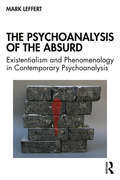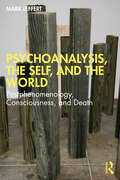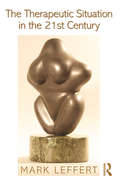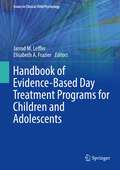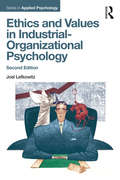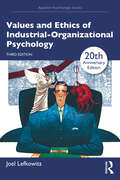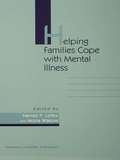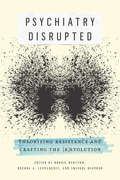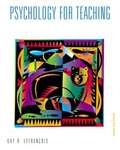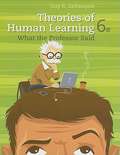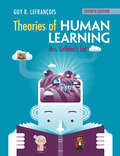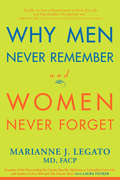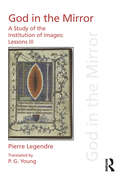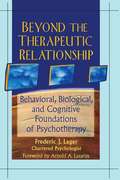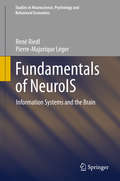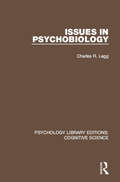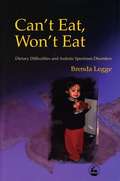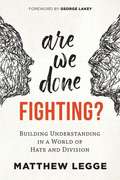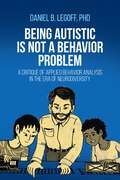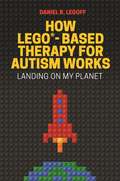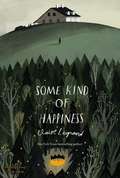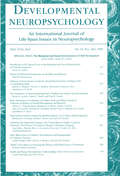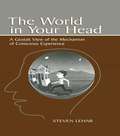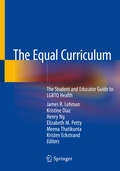- Table View
- List View
The Psychoanalysis of the Absurd: Existentialism and Phenomenology in Contemporary Psychoanalysis
by Mark LeffertThe Psychoanalysis of the Absurd offers an interdisciplinary study of Existentialism and Phenomenology and their importance to the clinical work of Contemporary Psychotherapy and Psychoanalysis. The concept of Absurdity, developed by Camus, has never been applied to the therapeutic situation or directly contrasted with its antithesis; the search for personal meaning. The book begins with narrative accounts of the historical development of Psychoanalysis, Existentialism and Phenomenology in 20th century Europe. The focus here is on fin de siècle Vienna and Paris between the Wars as the principal incubators of the two disciplines. Accompanied by composite case illustrations, Leffert then explores his own development of the Psychoanalysis of the Absurd, drawing on the work of Camus, Heidegger and Sartre. Absurdity is first discussed in relation to the Bio-Psycho-Social Self and Dasein is posited as a bridge concept, with personal meaning as the antithesis to Absurdity, before being discussed in relation to the world and how it impinges on self. A final chapter attempts to tie together particular issues raised by the book: Subjective well-being, Meaning, thrownness, Absurdity, Death and Death Anxiety and how we have become technologically enhanced human beings. Existential psychotherapy and psychoanalysis have, until now, largely gone their own way: the goal of this book is to fold them back into Contemporary Psychoanalysis. Establishing that the concept of Absurdity is of singular clinical importance to both diagnosis and therapeutic action, this book will be of great interest to clinicians, philosophers, and interdisciplinary scientists.
Psychoanalysis, the Self, and the World: Postphenomenology, Consciousness, and Death
by Mark LeffertThis book takes psychoanalysis into the 21st century, examining issues of existentialism, postphenomenology, social media, and death and death anxiety that have gone largely ignored in the psychoanalytic and psychotherapeutic literature. Using an interdisciplinary perspective, Leffert explains that it is impossible to close the door of the consulting room. The therapeutic relationship is invaded by the outside world and its relationships for both patient and therapist and cannot be isolated from these influences. Drawing on richly detailed case studies, Leffert demonstrates how the internet, social media, and the metaverse have changed and expanded the self in ways that could not have been imagined in the last century. In turn, Leffert acknowledges recent advances in the neurosciences, and addresses the lack of engagement with their implications for theories and practices of therapeutic action. Finally, the ways in which death and death anxiety impinge on the self, which have also gone mostly undealt with in psychoanalytic literature, become an important focus of this book. As a novel exploration of interdisciplinary connections, this book will be of use to both scholars and practitioners of psychotherapy, psychoanalysis, social network theory, philosophy, and neuroscience.
The Therapeutic Situation in the 21st Century
by Mark LeffertExtending the themes of Contemporary Psychoanalytic Foundations, The Therapeutic Situation in the 21st Century is a systematic reformulation of fundamental psychoanalytic concepts, such as transference, therapeutic action, and the uses of psychotropic drugs, in the light of recent developments in postmodernism, complexity theory, and neuroscience. Leffert offers formulations of areas not previously considered in any depth by psychoanalysts, such as power relations in the analytic couple, social matrix theory, and narrative theory informed by considerations of archaeology, genealogy, complexity, memory, and recall. He also considers new areas, such as the role of uncertainty and love in the therapeutic situation. This book is part of an ongoing effort to place psychoanalysis in the current century, and looks to outside as well as inside areas of thought to inform how we work and how we think about our work.
Handbook of Evidence-Based Day Treatment Programs for Children and Adolescents (Issues in Clinical Child Psychology)
by Jarrod M. Leffler Elisabeth A. FrazierThis book examines the intermediate level of mental health services with a focus on partial hospitalization program (PHP) and intensive outpatient program (IOP) models of care for youth. It reviews the history of PHPs and IOPs and highlights their current care models, demonstrating the increase in the development and implementation of evidence-based treatment (EBT) practices. The book explores issues relating to program development, implementation, and considerations for sustainability. It provides interventions designed to enhance the well-being of youth who are experiencing a range of mental health concerns as well as strategies to engage and involve their families. In addition, the book offers feasible strategies for measuring outcomes and applying these results to meaningful clinical evaluations in PHP and IOP settings. It describes the process of accessing and using these intermediate services as well as additional treatment resources that may be necessary in the continuum of mental health care for youth. Key areas of coverage include: The history and purpose of mental health care and the role of day treatment programs for youth.Working with program administration and other stakeholders, identifying a patient population, and engaging community and referral sources.The importance of family involvement, coordination of care, and simultaneously addressing the transactional relationship between physical and mental health.Transitioning youth from pediatric mental health services into the adult mental health system.Working with a diverse patient population in intermediate treatment programs.Providing practical information for families and practitioners navigating the pediatric mental health continuum of care. The Handbook of Evidence-Based Day Treatment Programs for Children and Adolescents is a must-have resource for researchers, professors, and graduate students as well as clinicians, therapists, course instructors, and other professionals in child and adolescent psychiatry, clinical child and school psychology, social work, counseling, public health, family studies, developmental psychology, pediatrics, and all related disciplines.
Ethics and Values in Industrial-Organizational Psychology, Second Edition (Applied Psychology Series)
by Joel LefkowitzEthics and Values in Industrial-Organizational Psychology was one of the first books to integrate work from moral philosophy, moral psychology, I-O psychology, and political and social economy, as well as business. It incorporates these perspectives into a "framework for taking moral action" and presents a practical model for ethical decision making. The second edition has added a chapter on Virtue Theory, including its application in I-O, Organizational behavior (OB) and business; expands Moral Psychology to two chapters, with more attention to moral emotions, effects of the "dark side" of personality, and the intuitionist model of moral judgment; expands the sections on social and economic justice; and expands the treatment of the Responsible Conduct of Research with a new chapter on Research Integrity. Examples from I-O research and practice, as well as current business events, are offered throughout. It is ideal for ethics and I-O courses at the graduate level.
Values and Ethics of Industrial-Organizational Psychology (Applied Psychology Series)
by Joel LefkowitzThis foundational text was one of the first books to integrate work from moral philosophy, developmental/moral psychology, applied psychology, political and social economy, and political science, as well as business scholarship. Twenty years on, this third edition utilizes ideas from the first two to provide readers with a practical model for ethical decision making and includes examples from I-O research and practice, as well as current business events. The book incorporates diverse perspectives into a "framework for taking moral action" based on learning points from each chapter. Examples and references have been updated throughout, and sections on moral psychology, economic justice, the "replicability crisis," and open science have been expanded and the "radical behavioral challenge" to ethical decision-making is critiqued. In fifteen clearly structured and theory-based chapters, the author also presents a variety of ethical incidents reported by practicing I-O psychologists. This is the ideal resource for Ethics and I-O courses at the graduate and doctoral level. Academics in Organizational Behavior and Human Resource Management will also benefit from this book, as well as anyone interested in Ethics in Psychology and Business.
Values and Ethics of Industrial-Organizational Psychology (Applied Psychology Series)
by Joel LefkowitzThis foundational text was one of the first books to integrate work from moral philosophy, developmental/moral psychology, applied psychology, political and social economy, and political science, as well as business scholarship. Twenty years on, this third edition utilizes ideas from the first two to provide readers with a practical model for ethical decision making and includes examples from I-O research and practice, as well as current business events. The book incorporates diverse perspectives into a "framework for taking moral action" based on learning points from each chapter. Examples and references have been updated throughout, and sections on moral psychology, economic justice, the "replicability crisis," and open science have been expanded and the "radical behavioral challenge" to ethical decision-making is critiqued. In fifteen clearly structured and theory-based chapters, the author also presents a variety of ethical incidents reported by practicing I-O psychologists.This is the ideal resource for Ethics and I-O courses at the graduate and doctoral level. Academics in Organizational Behavior and Human Resource Management will also benefit from this book, as well as anyone interested in Ethics in Psychology and Business.
Helping Families Cope With Mental Illness
by Harriet P Lefley Mona WasowIn this age of spiraling health care costs, it is imperative that the family's role in treating patients with chronic mental illness not be overlooked - by policy makers and clinicians alike. The families themselves insist that the government and care-providing agencies learn new ways to relate to them and patients. Helping Families Cope with Mental Illness is a comprehensive guide to the family's experience of chronic and serious mental illness for clinicians and educators in a wide range of mental health disciplines. It details all major areas of the clinician-family relationship - consumer perspectives, cultural diversity, social policy, ethical issues, practical coping strategies, research and training issues, major service issues, managed care, and cost-saving measures.
Psychiatry Disrupted
by Brenda A. Lefrançois Bonnie Burstow Shaindl DiamondThere is growing international resistance to the oppressiveness of psychiatry. While previous studies have critiqued psychiatry, Psychiatry Disrupted goes beyond theorizing what is wrong with it to theorizing how we might stop it. Introducing readers to the arguments and rationale for opposing psychiatry, the book combines perspectives from anti-psychiatry and critical psychiatry activism, mad activism, antiracist, critical, and radical disability studies, as well as feminist, Marxist, and anarchist thought. The editors and contributors are activists and academics - adult education and social work professors, psychologists, prominent leaders in the psychiatric survivor movement, and artists - from across Canada, England, and the United States. From chapters discussing feminist opposition to the medicalization of human experience, to the links between psychiatry and neo-liberalism, to internal tensions within the various movements and different identities from which people organize, the collection theorizes psychiatry while contributing to a range of scholarship and presenting a comprehensive overview of resistance to psychiatry in the academy and in the community. Contributors include Simon Adam (University of Toronto), Rosemary Barnes University of Toronto, Peter Beresford (Brunel University), Bonnie Burstow (University of Toronto), Chris Chapman (York University), Mark Cresswell (Durham University), Shaindl Diamond (York University), Chava Finkler (Memorial University), Ambrose Kirby (therapist in private practice, Brenda A. LeFrançois (Memorial University of Newfoundland), Mick McKeown (University of Central Lancashire), Robert Menzies (Simon Fraser University), China Mills (Oxford University), Tina Minkowitz (World Network of Users and Survivors of Psychiatry), Ian Parker (University of Leicester), Susan Schellenberg, Helen Spandler (University of Central Lancashire), and AJ Withers (York University). A courageous anthology, Psychiatry Disrupted is a timely work that asks compelling activist questions that no other book in the field touches.
Psychology For Teaching
by Guy R. LefrancoisIn this engaging and comprehensive text, Lefrancois explains, applies, illustrates, and investigates psychological principles and classroom practices in a way that is concise and informative as well as encouraging and entertaining. Based on the most recent research in human development as it relates to learning, teaching, and thinking, this book presents a well-rounded, thorough, and relevant discussion of psychological principles.
Theories of Human Learning: What the Professor Said
by Guy R. LefrancoisBoth a serious academic text and a delightful story, this book offers a clear, readable look at a full range of learning theories from behavioral to cognitive. It also covers memory, motivation, connectionism (neural net models), and social learning and concludes with a comprehensive synthesis. Its most apparent strength is its easily accessible style, but its greatest value lies in the clarity of its concepts and its emphasis on practical applications. THEORIES OF HUMAN LEARNING is narrated by a Professor. But this Professor isn't just anyone. In fact, those familiar with previous editions may conclude that he is related to Kongor and Kro, two extraterrestrials who so successfully guided students through the first two editions---or to the Old Man or, later, the Old Woman who led readers through the next editions. Wise as he is, the Professor does the job even more effectively than his predecessors in this sixth edition of THEORIES OF HUMAN LEARNING: WHAT THE PROFESSOR SAID.
Theories of Human Learning: Mrs Gribbin's Cat
by Guy R. LefrançoisBoth a serious academic text and an intriguing story, this seventh edition reflects a significant update in research, theory, and applications in all areas. It presents a comprehensive view of the historical development of learning theories from behaviorist through to cognitive models. The chapters also cover memory, motivation, social learning, machine learning, and artificial intelligence. The author's highly entertaining style clarifies concepts, emphasizes practical applications, and presents a thought-provoking, narrator-based commentary. The stage is given to Mrs Gribbin and her swashbuckling cat, who both lighten things up and supply much-needed detail. These two help to explore the importance of technology for simulating human cognitive processes and engage with current models of memory. They investigate developments in, and applications of, brain-based research and plunge into models in motivation theory, to name but a few of the adventures they embark upon in this textbook.
Why Men Never Remember and Women Never Forget
by Marianne J. Legato Laura TuckerWhy won't he ask for directions? Why does she always want to talk about the relationship? Why is it so hard for men and women to understand each other—and what can we do about it? These are the kinds of questions that are resolved at last in Why Men Never Remember and Women Never Forget from the founder of gender medicine. Dr. Marianne Legato not only confirms that men and women are different, but she uncovers the neuroscientific reasons behind the age-old disputes between the sexes, while providing a groundbreaking, authoritative, and reader-friendly guide to resolving them.
Pierre Legendre Lessons III God in the Mirror: A Study of the Institution of Images (Discourses Of Law Ser.)
by Pierre LegendreIn the context of our increasingly global legal order, Pierre Legendre’s God in the Mirror reconsiders the place of law within the division of existing bodies of knowledge. Navigating the texts of Ovid, Augustine, Roman jurists, medieval canon lawyers, Freud, Lacan, the notebooks of Leonardo de Vinci, and the paintings of Magritte, this third volume of Pierre Legendre’s Lessons focuses on the relation of the subject to the institution of images. Legendre tracks the origins and vicissitudes of the specular metaphor within western history, carrying out a critique of its dependence on the discourse of the Imago Dei. A crucial landmark within Legendre’s ongoing reconsideration of a medieval ‘revolution of interpretation’, this book dissociates the western normative tradition from its mythic foundation, separating theology and law. It thereby documents the advent of modern rational doubt, as a new legal foundation or ground: one that, for Legendre, was not only a revolutionary invention, but one that produced the modern European idea of the State.
Beyond the Therapeutic Relationship: Behavioral, Biological, and Cognitive Foundations of Psychotherapy
by Frederic J LegerSeeking to transfer knowledge across ideological boundaries within a theoretically valid, scientific framework, Beyond the Therapeutic Relationship draws upon and relates existing research from psychotherapy and the allied fields of human behavior. Author Frederic J. Leger has successfully cut across multifarious therapies to create an integrated, high-order theory that unites psychotherapy’s disparate forces. In the process, he addresses the theoretical underpinnings of the field of psychotherapy, the paradigm of the therapeutic relationship and its centrality to therapeutic change, the difficulties of creating a “scientific discipline” from the study of the psyche, and the factionalization of psychology into different competing schools.By exploring universal variables and how they fit into a causal nexus, Beyond the Therapeutic Relationship identifies transtheoretical processes of change that cut across diverse therapies. It also offers heuristic research direction and guidance in eclectic and integrative practice as it broadens the perspective on the psychotherapeutic encounter. Combining physiological, social, and psychological research into a transtheoretical psychodynamic theory, this important text discusses: why the need for paradigmatic direction is urgent bringing nonverbal variables to the therapist’s working awareness or focus how a small range of conceptual possibilities limits knowledge of human behavior the lack of efficacy in psychotherapy the psychobiological significance of intensive experiential exploration formation of the “self” through language and discourse integrative eclecticism within transtheoretical and common factors integrationPsychologists, psychiatrists, mental health therapists, and academics and students in psychology, psychiatry, and educational psychology now have a text that cuts across the multitude of therapeutic approaches to provide a theory that is empirically supported and grounded in the author’s 25 years of clinical practice. As you will see, Beyond the Therapeutic Relationship discusses the current position of the field of psychotherapy, where it needs to go, specific strategies for getting there as well as alternative interventions beyond empathy and the therapeutic relationship.
Fundamentals of NeuroIS
by Pierre-Majorique Léger René RiedlThis authored volume presents the fundamentals of NeuroIS, which is an emerging subfield within the Information Systems discipline that makes use of neuroscience and neurophysiological tools and knowledge to better understand the development, use, and impact of information and communication technologies. This book is an initial guide to this new research domain. The target audience primarily comprises PhD students and researchers, but the book may also be beneficial for graduate students and practitioners.
Issues in Psychobiology (Psychology Library Editions: Cognitive Science)
by Charles R. LeggAt the time of original publication psychobiology was one of the most rapidly developing areas of psychology. Its growth owed much to recent advances both in techniques for studying the physiological bases of behaviour and in major conceptual advances in the way people thought about the brain. First published in 1989, this textbook introduction to the field looks at the state of psychobiology in the light of these advances. The issues covered include: the factors that have shaped the current state of the field; the value of animal subjects in the study of psychological processes; the problems of studying the brain, including the theoretical assumptions underlying the most widely used methods; the current status of influential theories, like Stellar’s 2-center theory of motivation and Papez’s theory of emotion; the relationship between psychological theory and physiological data, such as recent accounts of the visual system; the problems presented by ‘emergent properties’ like consciousness.
Can't Eat, Won't Eat: Dietary Difficulties and Autistic Spectrum Disorders
by Brenda LeggeFinding out that your child has Asperger's Syndrome or Autism can be devastating enough, but when you discover that he or she won't eat 99.9 per cent of all food and drink in the known universe, the fun really starts. This was the situation the author found herself in a decade ago when her son first took a dislike to milk, and then to virtually every other substance she attempted to feed him. Her book was written to reassure other parents that there are lots of people out there in the same boat, and to suggest practical methods of dealing with the problem. As well as drawing on her own experience, the author has spoken to parents, children, and professionals with first-hand knowledge of dietary difficulties, and their advice and comments form a key part of the book.
Are We Done Fighting?: Building Understanding In A World Of Hate And Division
by Matthew Legge George Lakey Adam FarnsworthUnfounded beliefs and hateful political and social divisions that can cascade into violence are threatening to pull the world apart. Responding to fear and aggression strategically and with compassion is vital if we are to push back against the politics of hate and live in greater safety and harmony. <p> But how to do it? <p> Are We Done Fighting? is brimming with the latest research, practical activities, and inspirational stories of success for cultivating inner change and spreading peace at the community level and beyond. <p> Packed with inspiration and cutting-edge findings from fields including neuroscience, social psychology, and behavioural economics, Are We Done Fighting? is an essential toolkit for activists, community and peace groups, and students and instructors working to build dialogue, understanding, and peace as the antidote to the politics of hate and division.
Being Autistic is Not a Behavior Problem: A Critique of Applied Behavior Analysis in the Era of Neurodiversity
by Daniel B LeGoffApplied behavior analysis (ABA) has become a widely used form of therapy for autistic children without its theories and methods being well understood. This critical analysis of the theories and research on which ABA bases its claim to being an evidence-b
How LEGO®-Based Therapy for Autism Works: Landing on My Planet
by Daniel B. Legoff"You know, Dr. Dan, that kid is from my planet." With in-depth descriptions of LEGO®-based therapy in action, this book explains how and why it helps to promote the development of social skills for children with autism spectrum disorders (ASDs) and related conditions. Written by Daniel B. LeGoff, who pioneered the approach, this book comprises a series of case histories of children who participated in LEGO® therapy. It traces the development of the evidence-based approach, shares the clinical insights gained along the way and highlights the principles which should be at the core of all effective treatment and educational strategies for children with ASDs. The case histories have real practical value for those working with children with ASDs and also help to demonstrate the subtleties of the adult facilitation role for professionals running sessions.
Some Kind of Happiness
by Claire LegrandReality and fantasy collide in this “beautiful and reflective tale” (Booklist, starred review) for fans of Counting by 7s and Bridge to Terabithia, about a girl who must save a magical make-believe world in order to save herself.Things Finley Hart doesn’t want to talk about: -Her parents, who are having problems. (But they pretend like they’re not.) -Being sent to her grandparents’ house for the summer. -Never having met said grandparents. -Her blue days—when life feels overwhelming, and it’s hard to keep her head up. (This happens a lot.)Finley’s only retreat is the Everwood, a forest kingdom that exists in the pages of her notebook. Until she discovers the endless woods behind her grandparents’ house and realizes the Everwood is real—and holds more mysteries than she’d ever imagined, including a family of pirates that she isn’t allowed to talk to, trees covered in ash, and a strange old wizard living in a house made of bones.With the help of her cousins, Finley sets out on a mission to save the dying Everwood and uncover its secrets. But as the mysteries pile up and the frightening sadness inside her grows, Finley realizes that if she wants to save the Everwood, she’ll first have to save herself.
The Biological and Social Determinants of Child Development: A Special Double Issue of developmental Neuropsychology
by Steven M. LeharThe Biological and Social Determinants of Child Development stimulates cross-disciplinary communication and research collaboration in the field of child development. While the papers in this issue seem diverse in terms of topic and discipline, there are a number of common themes: *critical period for brain development and the importance of specific environmental input during this period; *importance of early brain development and enriched environments is supported in articles describing findings from human studies; *potential for brain plasticity following specialized retraining is found in a compelling paper demonstrating different profiles of brain activation for normal readers vs. those who have dyslexia and younger children at high risk for development of reading disabilities; and *critical period, brain plasticity, and parallel changes in developing behavior and brain structure and functioning. As a number of papers in this issue describe potential interventions, one is relevant because it describes the numerous factors that make results of such studies have the potential to generalize to larger populations. Putting the described papers in a broad perspective, the last article argues that we cannot understand the health status of a society without understanding the health-determining influences across the life course.
The World in Your Head: A Gestalt View of the Mechanism of Conscious Experience
by Steven M. LeharThe World In Your Head: A Gestalt View of the Mechanism of Conscious Experience represents a bold assault on one of the greatest unsolved mysteries in science: the nature of consciousness and the human mind. Rather than examining the brain and nervous system to see what they tell us about the mind, this book begins with an examination of conscious experience to see what it can tell us about the brain. Through this analysis, the first and most obvious observation is that consciousness appears as a volumetric spatial void, containing colored objects and surfaces. This reveals that the representation in the brain takes the form of an explicit volumetric spatial model of external reality. Therefore, the world we see around us is not the real world itself, but merely a miniature virtual-reality replica of that world in an internal representation. In fact, the phenomena of dreams and hallucinations clearly demonstrate the capacity of the brain to construct complete virtual worlds even in the absence of sensory input. Perception is somewhat like a guided hallucination, based on sensory stimulation. This insight allows us to examine the world of visual experience not as scientists exploring the external world, but as perceptual scientists examining a rich and complex internal representation. This unique approach to investigating mental function has implications in a wide variety of related fields, including the nature of language and abstract thought, and motor control and behavior. It also has implications to the world of music, art, and dance, showing how the patterns of regularity and periodicity in space and time--apparent in those aesthetic domains--reflect the periodic basis set of the underlying harmonic resonance representation in the brain.
The Equal Curriculum: The Student and Educator Guide to LGBTQ Health
by James R. Lehman Kristine Diaz Henry Ng Elizabeth M. Petty Meena Thatikunta Kristen EckstrandThis first-of-its-kind textbook marks a revolutionary effort to reform medical education nationally by providing a comprehensive, high-quality resource to serve as a foundation for lesbian, gay, bisexual, transgender, and queer (LGBTQ) health education across multiple disciplines. Addressing the decades-long unequal weight of medical education generally offered about the care of LGBTQ people, The Equal Curriculum was created to advance clinicians' competencies in optimizing the health of LGBTQ people. This textbook is designed to be integrated into health sciences curricula and offers pointed strategies to evaluate the integration of LGBTQ health topics. Starting with a brief overview, chapters 1 through 4 cover general content that is highly relevant to all health professionals working with LGBTQ people. Chapters 5 through 12 focus on specific patient populations and clinical specialties, and chapters 13 and 14 cover special topics. Key points in each chapter are highlighted to aid in the comprehension, and case vignettes are provided throughout the textbook, allowing learners to apply the content to clinical scenarios in order to evaluate how the application of relevant knowledge may impact health outcomes. Questions similar to National Board of Medical Examiners (NBME) style are provided in most chapters to assist in the application of content. As major addition to the clinical literature, The Equal Curriculum: Student and Educator Guide to LGBTQ Health should be of great interest to health sciences instructors, medical students in their preclinical and clinical phases, and trainees from other disciplines, such as physician assistants, nurses, social workers, and public health professionals.
